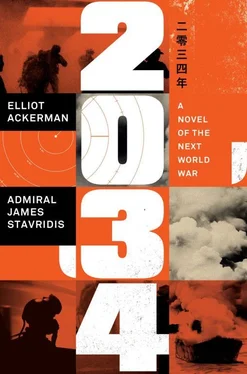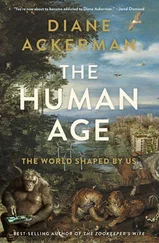Three days after Major Mitchell went missing, his name was leaked by someone in the administration to a cable news network. An anchor at that network then paid a visit to the Mitchell family home outside of Kansas City, Missouri, where she found quite a story: four generations of Marine fighter pilots. The anchor conducted her interview in a living room with nearly one hundred years of memorabilia hanging on the walls, from captured Japanese battle flags to a blood-splattered flight suit. On camera, Major Mitchell’s father described his son, while from time to time staring vacantly into the backyard, out toward a tree with the two rusted steel anchor points of a swing set drilled into its thickest branch. The elder Mitchell spoke about the family, the decades of tradition, all the way back to his own grandfather, who had flown with the vaunted Black Sheep squadron in the Second World War. The segment integrated photos of the young, handsome Major Chris “Wedge” Mitchell alongside photos of his father, and of his “Pop,” and of his “Pop-Pop,” the passage of generations linking the America of this time to the America of another time, when the country had been at the height of its greatness.
The video went up online, and within hours, it had been watched millions of times.
At a National Security Council meeting in the Situation Room on the fifth day of the crisis, the president asked if everyone had seen the segment. They all had. Already, #FreeWedge had begun to trend heavily on social media. One only had to look out of any West Wing window to see the proliferation of black POW/MIA flags that overnight picketed the Washington skyline. The president wondered aloud why the plight of this one pilot seemed to resonate more profoundly than the deaths of hundreds of sailors in the South China Sea. The room grew very quiet. Every staffer knew that on her desk for signature were the letters of condolence to the families of the Levin , Chung-Hoon , and John Paul Jones . Why, she asked rhetorically, does he matter more than them?
“He’s a throwback, ma’am,” Chowdhury blurted out.
He didn’t even have a seat but was standing against the wall among the other backbench staffers. Half the cabinet turned to face him. He immediately regretted that he’d opened his mouth. He glanced down at his hands, as if by looking away he might convince the room that someone else had spoken, that his comment had been some strange act of ventriloquism.
In a firm but measured tone the president asked him to explain.
“Wedge is a link in a chain,” Chowdhury began hesitantly, gaining confidence as he went. “His family ties us back to the last time we defeated a peer-level military. The country can intuit what might be coming. Seeing him reminds people of what we as a nation are capable of accomplishing. That’s why they’re so invested in him.”
No one either agreed or disagreed with Chowdhury.
After a few beats of silence, the president told the room that she had one goal, and one goal alone, which was to avoid an escalation that would lead to the type of peer-to-peer conflict Chowdhury had mentioned. “Is that clear?” she said, leveling her gaze at those around the conference table.
Everyone nodded, but a lingering tension made it evident that not everyone agreed.
The president then stood from her seat at the head of the table and left, a trail of her aides following behind her. The hum of conversation resumed. The various secretaries and agency heads engaged in sidebar discussions, leaning in to one another as close as conspirators as they filtered out into the corridor. A pair of junior aides swept into the room and checked that no sensitive notes or errant document had been left behind.
As Chowdhury migrated back to his desk, his boss, Trent Wisecarver, found him. “Sandy…” Like a child who can tell whether he is in trouble from the inflection of a parent’s voice, Chowdhury could tell immediately that Wisecarver was upset with him for speaking out of turn in the meeting. Chowdhury began to equivocate, apologizing for his outburst and making assurances that it wouldn’t happen again. More than a decade before, Wisecarver’s young son had perished in the coronavirus pandemic, an event many attributed to Wisecarver’s hawkish political awakening and that made him adept at projecting fatherly guilt onto those subordinates he treated as surrogate children.
“Sandy,” repeated Wisecarver, though his voice was different now, a bit softer and more conciliatory. “Take a break. Go home.”

03:34 March 20, 2034 (GMT+4:30)
Tehran
At first Wedge thought he was home. He’d woken up in a dark room, in a bed, with clean sheets. He couldn’t see a thing. Then he noticed a single bar of light beneath what must have been a shut door. He lifted his head to take a closer look. That’s when the pain hit him. And with the pain came the realization that he was very far indeed from home. He returned his head to the pillow and kept his eyes open to the dark.
He couldn’t quite remember what had happened at first, but slowly, details began to emerge: his starboard wing dancing along the border… losing flight control… his attempt to eject… his descent toward Bandar Abbas… his smoking a Marlboro on the tarmac… the man with the scars… the pressure of that three-fingered grip against his shoulder. It took an entire night for these details to resurface.
He ran his tongue through his mouth and could feel the gaps among his teeth. His lips felt fat and blistered. Light began to suggest itself at the rim of the curtains. Wedge was soon able to take in his surroundings, but his vision was blurred. One of his eyes was swollen shut, and he could hardly see through the other.
Without his vision, he’d never fly again.
Everything else would heal. Everything else could be undone. Not this.
He tried to reach his hand to his face, but his arm couldn’t move. His wrists were cuffed to the frame of the bed. He pulled and then pulled again, his restraints rattling as he struggled to touch his face. A hurried procession of footsteps advanced toward his room. His door opened; balanced in the brightly lit threshold was a young nurse wearing a hijab. She held her finger to her mouth, shushing him. She wouldn’t come too close. She formed both hands into a pleading gesture and spoke softly in a language Wedge didn’t understand. Then she left. He could hear her running down the corridor.
There was light in his room now.
Hanging from a metal arm in the far corner was a television.
Something was written on its bottom.
Wedge relaxed his throbbing head against the pillow. With his un-swollen eye, he focused on the television and the piece of text embossed at its base. It took all of his concentration but, slowly, the letters became sharper, shoring up around the edges. The image gathered itself, coming into focus. Then he could see it, in near twenty-twenty clarity, that fantastic and redeeming name: panasonic.
He shut his eyes and swallowed away a slight lump of emotion in his throat.
“Good morning, Major Wedge,” came a voice as it entered. Its accent was haltingly British, and Wedge turned his attention in its direction. The man was Persian, with a bony face cut at flat angles like the blades of several knives, and a precisely cropped beard. He wore a white orderly coat. His long, tapered fingers began to manipulate the various intravenous lines that ran out of Wedge’s arms, which remained cuffed to the bed frame.
Wedge gave the doctor his best defiant stare.
The doctor, in an effort to ingratiate himself, offered a bit of friendly explication. “You suffered an accident, Major Wedge,” he began, “so we brought you here, to Arad Hospital, which I assure you is one of the finest in Tehran. Your accident was quite severe, but for the past week my colleagues and I have been looking after you.” The doctor then nodded to the nurse, who followed him around Wedge’s bedside, as though she were the assistant to a magician in the midst of his act. “We very much want to return you home,” continued the doctor, “but unfortunately your government isn’t making that easy for us. However, I’m confident this will all get resolved soon and that you’ll be on your way. How does that sound, Major Wedge?”
Читать дальше













